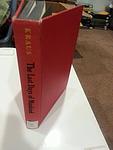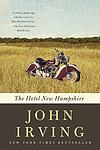The Greatest "Vienna, Drama" Books of All Time
Click to learn how this list is calculated.
This list represents a comprehensive and trusted collection of the greatest books. Developed through a specialized algorithm, it brings together 300 'best of' book lists to form a definitive guide to the world's most acclaimed books. For those interested in how these books are chosen, additional details can be found on the rankings page.
Genres
Drama is a genre of literature that typically deals with serious and emotional themes, often exploring the complexities of human relationships and the struggles individuals face in their lives. These books often feature intense character development and intricate plotlines, delving into the depths of human experience and the challenges of navigating the world around us. From family dramas to political intrigue, the drama genre encompasses a wide range of stories that aim to captivate readers with their raw and powerful storytelling.
Countries
Date Range
Reading Statistics
Click the button below to see how many of these books you've read!
Download
If you're interested in downloading this list as a CSV file for use in a spreadsheet application, you can easily do so by clicking the button below. Please note that to ensure a manageable file size and faster download, the CSV will include details for only the first 500 books.
Download-
1. The Piano Teacher by Elfriede Jelinek
"The Piano Teacher" is a dark exploration of power dynamics, sexuality, and repression. The story revolves around a piano teacher at a prestigious music school in Vienna who lives with her overbearing mother in a state of emotional and sexual repression. Her life takes a turn when she becomes sexually involved with a young, self-assured student. The relationship, marked by sadomasochistic games and emotional manipulation, spirals out of control, leading to a tragic end. The book is a profound critique of bourgeois values and the oppressive structures of society.
-
2. Confusion by Stefan Zweig
"Confusion" is a compelling narrative that explores the intense and passionate relationship between a student and his charismatic professor. Set in the early 20th century, the story unfolds as the protagonist becomes entangled in the professor's personal life, discovering his mentor's secret past, his struggling marriage, and his hidden homosexual desires. The book presents a profound exploration of human emotions, identity, and the complexities of love, against the backdrop of the societal norms of the time.
-
3. The Last Days of Mankind by Karl Kraus
"The Last Days of Mankind" is a satirical play that provides a critical commentary on the socio-political climate during World War I. The narrative presents a stark portrayal of the absurdity of war and the destructive forces of propaganda, bureaucracy, and nationalism. The author uses a variety of literary techniques, including parody, satire, and direct quotes from contemporary sources, to highlight the folly and tragedy of war. The play is known for its unique style, rich language, and its profound critique of society and culture during a time of great upheaval and conflict.
-
4. The Hotel New Hampshire by John Irving
The novel follows the Berry family, whose eccentricities and resilience are tested over generations, particularly through their experiences running various incarnations of the eponymous hotel. From their original establishment in New England to a second in Vienna, the Berrys encounter a cast of quirky characters, endure tragedies, and navigate complex relationships. Themes of love, loss, and the pursuit of dreams are explored against a backdrop of political and social upheaval, with the family's unique motto, "Keep passing the open windows," serving as a refrain for their determination to persevere in the face of life's absurdities and challenges.
-
5. Plays And Stories by Arthur Schnitzler
"Plays and Stories" is a collection that showcases the work of a prominent writer known for his incisive exploration of psychology and morality in turn-of-the-century Viennese society. The book brings together a selection of his dramatic and narrative pieces, each delving into the complex lives and intimate struggles of its characters. Through a blend of sharp dialogue, intricate character studies, and a keen observation of social mores, the collection reveals the subtle forces at play in love, desire, and power, often highlighting the ironic twists of fate that can alter the course of an individual's life. The writer's work is celebrated for its nuanced depiction of the human condition and its influence on modernist literature.
-
6. Selected Plays And Libretti by Hugo von Hofmannsthal
This collection brings together a selection of dramatic works by a prominent figure in the early 20th-century literary world, showcasing his talent for blending poetic language with profound psychological insight. The plays and libretti included span various genres, from historical dramas to adaptations of classic myths, each marked by the author's exploration of themes such as identity, transformation, and the human condition. The works also reflect the author's collaboration with influential composers of his time, contributing to the evolution of opera and theater through his innovative approach to storytelling and character development.
-
7. Amadeus by Peter Shaffer
The play explores the tumultuous life of a young musical genius, as seen through the envious eyes of his less-talented contemporary. Set in the opulent world of 18th-century Vienna, the story delves into the bitter rivalry between the established court composer and the prodigious newcomer who threatens to overshadow him. As the older composer recounts his efforts to undermine the young virtuoso's career, a complex narrative of obsession, intrigue, and madness unfolds, culminating in a haunting examination of the price of genius and the destructive nature of jealousy.
-
8. Professor Bernhardi by Arthur Schnitzler
The play revolves around a Jewish physician who heads a Viennese clinic and becomes embroiled in a scandal when he prevents a Catholic priest from giving the last rites to a dying patient who is unaware of the seriousness of her condition. His actions, motivated by a desire to preserve the patient's peace of mind, are misinterpreted as anti-Catholic, leading to a public outcry and a power struggle that reflects the deeply ingrained anti-Semitism and political opportunism of the time. The doctor's principled stand becomes a flashpoint for societal and professional conflict, raising questions about ethics, religion, and the corrosive effects of prejudice.
-
9. Tales From The Vienna Woods by Ödön von Horváth
This narrative is a darkly comedic and ironic tale set in 1930s Austria, which delves into the lives of ordinary Viennese citizens as they grapple with the socio-economic pressures of the time. The story revolves around a young woman who, in her pursuit of happiness and escape from a suffocating family, becomes entangled in a series of romantic relationships that lead to disillusionment and tragedy. The work critiques the romanticized vision of Vienna by juxtaposing the city's charming waltzes and idyllic woods against a backdrop of moral decay, hypocrisy, and the looming shadow of fascism.
Reading Statistics
Click the button below to see how many of these books you've read!
Download
If you're interested in downloading this list as a CSV file for use in a spreadsheet application, you can easily do so by clicking the button below. Please note that to ensure a manageable file size and faster download, the CSV will include details for only the first 500 books.
Download





